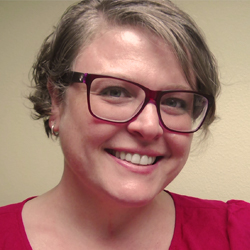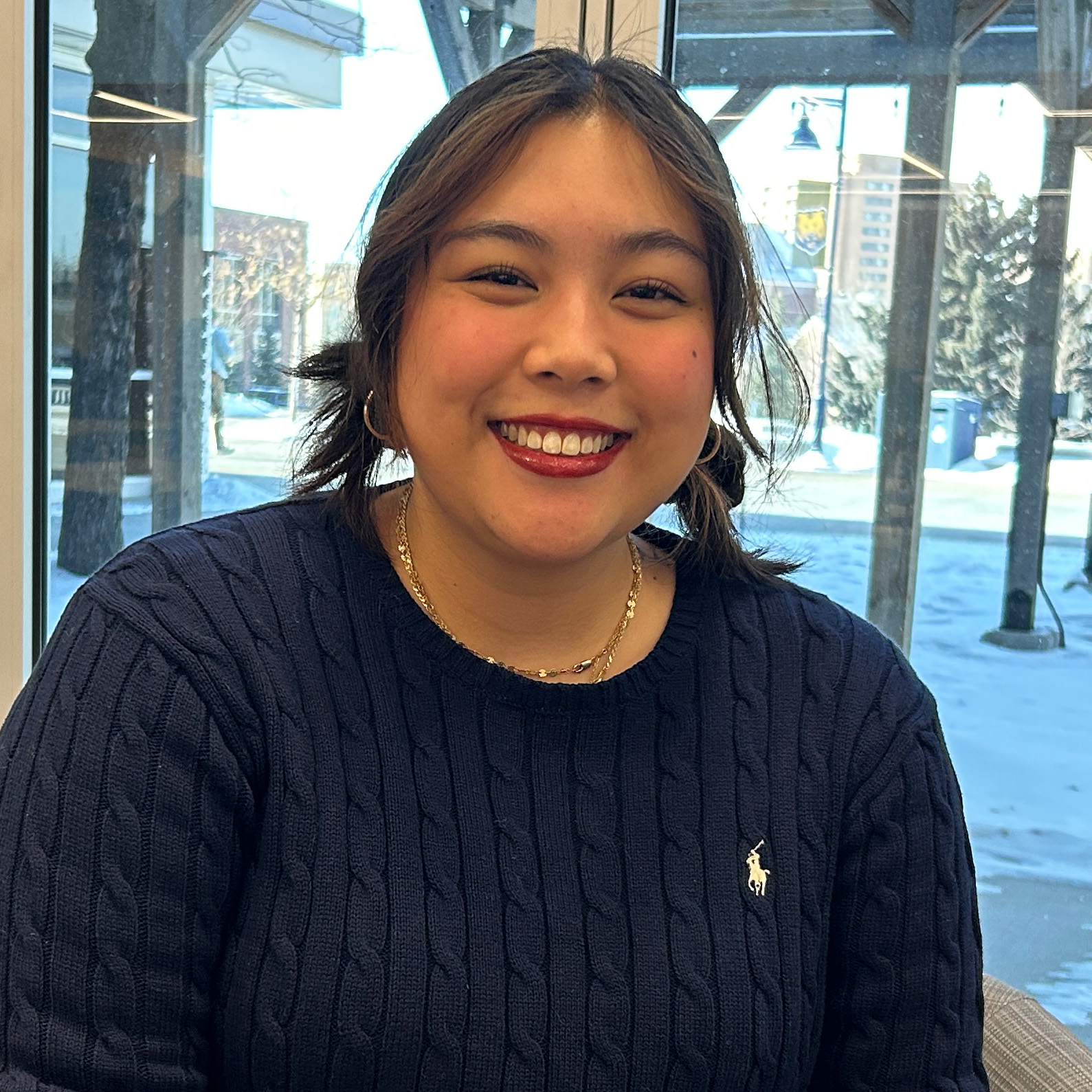
Assistant Professor of English and Writing Center Director discusses UNC’s resources and tips for successful writing.
You were listening to. Bear in mind, the university of Northern Colorado is official podcast. Join us each episode as we listened to the voices from UNC faculty, staff, students and alumni as they offer insights of local or national importance. This is your host, Dannon Cox, bringing you just a taste of UNC.
My name is Melody Denny. I'm an assistant professor of English and the Writing Center Director.
How did you get into this career?
That's a great question. I actually only recently realized this when I was talking about a work study position. My very first work study position as a first semester, first year student was in a writing lab. I fell into it, I liked it. And then when I transferred, basically I have been a writing center tutor my whole life. So as a bachelor's student, as a master's student and as a PhD student and it's just the place where I feel the happiest and where I feel like I have the most impact.
Did you ever try to branch out or did the universe kind of always bring you back?
I did branch out. I took the path of doing ESL or English as a second language instruction for several years. And I did that at the instructor level, but when I went back to work on my PhD, I got sucked back in in a good way, but I got sucked back then in the writing center. And then that's where I ended up doing all of my dissertation research and it just all fell into place.
Just curious, what was your dissertation research?
It's a little dorky. Um, I look at...
What isn't dorky at a dissertation level, right?
(laughs)That's true. Okay. So I look at the talk between tutors and consultants at the table and I do a conversation analysis methodology. So it's really like looking at the talk at the microscopic kind of level, if you will. And I look to how they negotiate specifically how the tutor or the consultant scaffolds and how that scaffolding and autonomy is transferred to the writer throughout the session and throughout multiple sessions.
Case study?
Actually I have like 50 videos recorded, but I only looked at intensely four videos for the, for the dissertation. And so I guess you could call it like a multiple case study. Um, but I didn't really call it that specifically. Yeah.
And you've done that through your entire college career and now here at UNC. And what are you doing here?
Well, changing the world one writing center session at a time (laughs) So I was hired specifically to direct the writing center and I also get to teach two first year writing classes a semester. But the bulk of my time is probably spent in the writing center. I train consultants, so we have consultants from all different levels and all different majors. So we have first semester, first year students and we have PhD students who have been working on their dissertation for a few semesters. So it's my job to train them and make sure they know how to respond to writing, all different kinds of writing from all different levels, from all different disciplines and just to make sure that the writing center is running smoothly and giving the type of assistance that students need.
How does that work with the diversity of students and to find a match? What's the best way to say that?
Like a match between consultant and writers?
Yes.
It's pretty haphazard at first because you don't really know what the consultant's background or level is when you make an appointment or when you come in and sometimes it's a matter of just figuring out who fits with you or who clicks with you. A lot of times people will find that and they'll just come back to that person again and again. And so usually we suggest that if it didn't feel quite natural the first time, ry it again. Maybe it was a personality thing. And I'm totally fine with students deciding I'm not their cup of tea. So, and I think all of the consultants feel that way. We know that we needed to have comfortable working relationships. And that's not always like just who you randomly decide on, so to kind of shop around a little.
Is there, I know this sounds kind of odd, but like a stats card because for instance like, or a bio card, because as a graduate student I might be wanting to get another graduate student.
There is not, but I am working on revising the writing center website and that's one of the things is to put a consultant bio's and kinda know like what their area of study or specialty is. Like we have a couple people who are total MLA experts and love MLA and we have a couple of people like myself who love APA. And just knowing who might have the background to better serve you is just helpful. And so you're right, a lot of graduate students do like to work with graduate students, which we have several of in the writing center as well.
What other information would students need to know if they're interested in going to the writing center. Like scheduling, drop ins, things like that.
So we offer both appointment and walk in sessions. So to make an appointment, you'd go to our website, which is unco.edu/writing-center. And you click on the make an appointment button and it takes you to our online scheduling system. They do have to create their own login with that system and it is separate from the their UNCO and banner stuff. But once they're logged in, they can create or they can select whoever they? want to that fits with their timeframe and they can do 30 and 60 minute options.
We also offer face to face sessions as well as E-tutoring. So if you're a person who also works and goes to school, or maybe you're doing some online classes this semester, you can make an E-tutoring appointment and upload your paper and we'll respond to your specific questions within 24 hours. And then if you just want to stop by, we have consultants available almost every hour specifically for walk-in sessions. And if we have any consultants who are not with a writer at that time, then you can absolutely make an appointment and have that session right then.
Do you have any suggestions and or warnings for students?
I try to make it more positive than negative but it's helpful if you have your assignments (laughs). Some of our consultants, um, are happy to work on paper and or computer. We have a couple of computers, some students bring in their laptops. We just need to have access to that. It's also really helpful to know what the assignment calls for, and if you have the assignment sheet because sometimes you're like, 'well this is supposed to be a paper about something.' And we're like, okay. So it's most helpful if we know what the end goal is for the assignment so that we can work towards meeting those criteria that the professor has laid out. So I think just having the assignment sheet with you is probably number one.
There are some misconceptions sometimes with writing centers that we are like an editing or proofreading service. And while while we will absolutely help students figure out some editing and proofreading strategies and teach them as we go, we will not do the work for them. So again, we'll help with grammar, but we're not going to just do it.
You're not going to write it.
No. I mean, I'm very happy to explain all kinds of grammar and mechanics rules, but at a certain point you're going to have to take over and find those mistakes on your own. Yeah.
Have there been any patterns among the student population when they come into the writing center of, I guess I'm kind of going at like maybe like a cultural idea of, I don't want to say mistakes, right? Because we're staying positive, staying positive, but maybe something that, uh, that secondary education didn't prepare them for it and then they come to college.
well there's always a transition period. So first year students are our largest clientele followed right by graduate students because it's that transition period. So anytime you move from one level to another, like high school to? college or undergrad to grad, there's that, 'Whoa, what am I doing?' 'How are the expectations different?' And so I think that a lot of students, especially first year students or maybe first semester graduate students feel like they should be prepared and they're like, 'I should be able to figure this out.' But it's completely different. So being able to ask for help and just talking about the expectations of academic writing and how that might differ between high school and college or undergrad and grad is really important. And so I think they're trying to make the framework of high school fit with college and that doesn't always work. Sometimes it does, but not always. And so it's like trying to make it fit into this frame that doesn't quite work out.
The writing center is located in Ross hall room 1230. Um, you could swing by to make an appointment or you can visit us on our website at unco.edu/writing-center
We are very nice and helpful. Um, and we will work with writing at any stage of the writing process. So let's say that a student has an assignment that they don't even know how to get started. Come in and we can talk to you about brainstorming ideas. So like, I don't even know how to, what do I do? And we could do things like help you locate some sources. We are not librarians that we can get you started or show you where to go in the library.
Sometimes I help with things like footnotes, like how do I format this? So there are all kinds of questions. There are no dumb questions, so absolutely bring in those questions and sometimes it's an easy fix and sometimes it's like, 'yeah, I don't know why you can't put that footnote here. Let's look it up.' So we're more about teaching writers the resources that they can access.
So the best writing center sessions actually end up with writers not needing us anymore because we've transitioned them to be independent. That's not to say you can't come in and keep seeing us cause every writer needs a reader and every piece of writing could use another look. I like to say that writing is never finished. It's just due, right? And so revision is a huge part. And not to? be afraid of revising because there's always more and better things to say.
I'm just going to add on one tiny note on that. And that is what you told me too, 'don't forget to read it out loud.'
Yay! It's very helpful. Which is why we read papers aloud in the writing center, because you do hear that. So especially if you're a native speaker, you can pick up on a lot of that stuff just by doing that.
Music:
Podington Bear – Caterpillar Tunnel
Chris Zabriskie – Readers Do You Read




